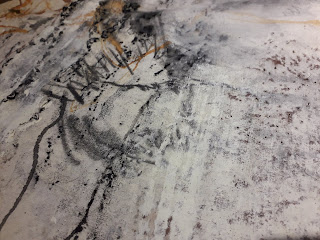On the course with Matthew Harris 'You are Here' in Puglia , how we responded to our 'space' on our fabric pieces to a series of prompts was chosen by throwing a dice. The order of the tasks we completed in painting, stitching and manipulation our work were selected in the same way.
An interesting , liberating ( and sometimes frustrating) approach, it both took the pain out of deciding what to do while also taking you outside your comfort zone. It meant that everyone was doing the same activities but in completely different orders ( good for seeing how others had responded and steal their ideas! ) . Would my cloth would have turned out differently if it had been done in a different order? Very probably.
The 'Space' Prompts ( and the order I did them )
1( 5th) Shadow
2 (6th) Line
3 (1st) Repetition
4 (4th) Touch/Feel
5 (3rd) Shape (+ve/-ve)
6 ( 2nd) Construct ( build)
Repetition
Repetition
Repetition
My first prompt was ' Repetition' so taking my cloth to my space I took rubbings in graphite of the markings on a metal drain cover; drew oak leaves with the prickly pear orange ink; used drops of Paynes grey ink to represent the black moss ( and folded the cloth to get a print while it was still wet)
My second prompt was ' Construct' - I found a piece of wood with holes in and referencing the mosses and lichens , placed acorn cups in the hollow and stuck the( rather fragile ) stalks of the acorn cups in the holes. Although the idea was to do it in situ, I took it back with me afterwards to the studio and added some more but forgot to take a photo. It did look like spore capsules of a moss or ' pixie cup' of a lichen.
 |
| Shape ( positive/negative) |
The 3rd Prompt I tackled was shape ( positive / negative) , drawing the gaps between the stones on the wall with crayon.
 |
Touch/Feel
|
I didn't spend long in my space for 'Touch/ Feel' where I took a rubbing of the oak bark as appropriately enough , I managed to brush past a large clump of 'Spanish Needles' ( Bidens pilosa) and had 100's of the hooked seeds attached to my trousers and socks! I went back to my room to change - it took half an hour to remove them. Next time I went to my space I made very sure I went nowhere near them!
 |
| Shadow |
I used cuts in the cloth for 'Shadow' , the 5th prompt, around the outline of the drawing of the oak leaves I'd done for 'repetition' . As well as recording the lines cast by actual leaves, the cuts themselves cast interesting marks below .
While I was there , I took photos and did a drawing for the last prompt 'Lines' as I wanted to do this on the cloth in stitch in the comfort of the studio ( particularly as my subject - the holes in a rock that made up lines was also where I sat to draw while in my space!)
 |
| Lines on cloth : paint and stitch |
1 (6th) Lay down blocks of colour ( large/small; transparent/opaque) Obliterate/ knock back different area ( a mixture of white emulsion with a hint of yellow to march the calico was used for this )
2 ( 1st) Select a small detail and work with it on a larger scale ( and vice versa)
3 (2nd) Manipulation (stitch/cut, distort, pleat, cut into surface
4 (4th) In one area work back to front, +ve to -ve, Try wax resist and layering colour on top , use stitch as a resist
5 (3rd) Collage with found material, cloth/paper/bundles of threads/paper in response to information already there ( attach with stitch/binding, not glue)
6 (5th) draw or mark with pure stitch , different scales .
After the first couple of trips to my 'space' sometimes I combined the activity/prompt with the task ( saved throwing the dice, reusing the same number). As time went on and the layers accumulated, it becomes a bit tricky to remember what I did and when! But then the process became more about responding to the cloth itself and making changes - I'll show the evolution of some areas in another post but meanwhile , the photos below show some of the ways I interpreted the 'tasks'.
T1 Add Colour
|
T1 Obliterate
T2 Change scale, T3 Manipulate
T5 Collage
T6 Stitch |

















1 comment:
Interesting process, like the results very much, a good way of learning I would think
Post a Comment